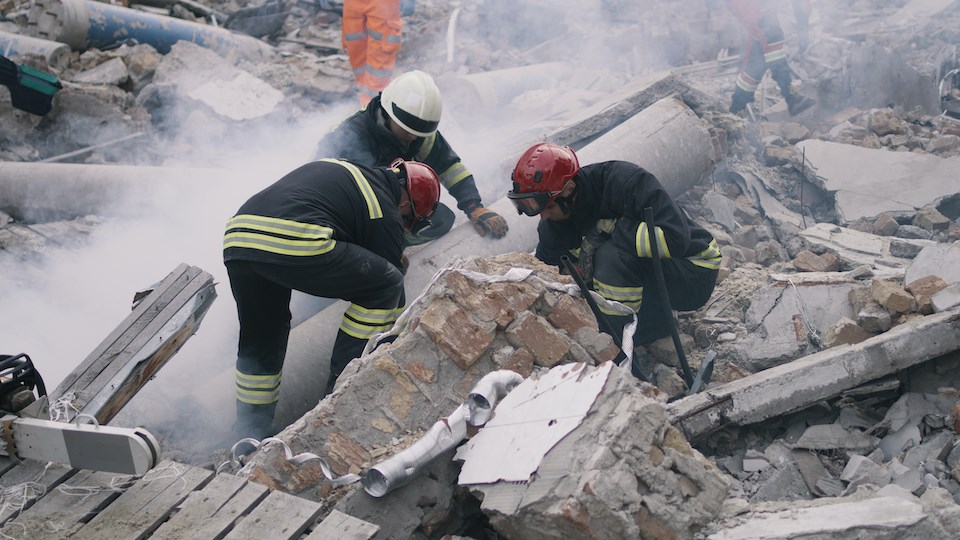Is an earthquake possible in Vancouver as a result of this week's massive one in Tawain?
The B.C. coast was on tsunami watch following a devastating 7.2 magnitude earthquake that struck Taiwan on Tuesday, April 2, killing nine people, injuring thousands, and stranding dozens of workers. It is the most powerful earthquake to hit the country in a quarter-century.
But a Vancouver-based earthquake expert says ramifications following the disaster wouldn't be felt soon afterwards.
Dr. Tony Yang is a professor in the Department of Civil Engineering at the University of British Columbia (UBC) and says an earthquake on the other side of the globe didn't cause a tsunami in British Columbia immediately but could have impacts in the future.
The impact of any seismic activity has a ripple effect on the planet, particularly when an event is located on what's known as the Pacific "Ring of Fire."
The "Ring of Fire" is a line of volcanoes and earthquake sites around the edges of the Pacific Ocean. It includes places along the coast of Western Canada and the United States to countries in Central and South America and overseas to places extending from Russia to Japan, and Southeast Asia to New Zealand and Papa New Guinea.
Over 1,000 earthquakes happen across Western Canada each year and over 100 of them are over a 5 magnitude, meaning they could cause damage if they occurred on land, according to Earthquakes Canada
The earth's crust is composed of plates that fit together like pieces of a puzzle and are constantly moving (but at a glacial speed of roughly two to 10 cm annually). They can slide past one another, collide, or move apart.
The B.C. coast is one of the few places in the world where plates move in all three ways, resulting in significant seismic activity.
While the Taiwan quake won't cause an obvious impact locally, the effects could be felt down the line.
"The earthquake in Taiwan will not immediately cause an immediate effect but the ridges are being pushed...and that's why an earthquake happens," Yang told V.I.A.
"Other plates will be picking up the additional stresses."
The concentration of earthquakes along B.C.'s coast is related to "the presence of active faults," which are breaks in the earth's crust. These breaks allow hot air from the earth's core to escape; if one of the plates moves, others will shift to balance it out.
"Everything has to be in balance," he explained. "Right now we don't have enough technology to monitor the entire earth so it is difficult to measure where the impact will be."
Could the "Big One" strike B.C. sooner following the recent Taiwan earthquake?
One earthquake far away isn't a clear indicator of impacts locally. But B.C. is due for a devastating megathrust earthquake and subsequent tsunamis, often called the "Big One."
Over the last several decades, scientists have become increasingly aware that the Cascadia Subduction Zone, which runs through southwest B.C., could be the site of a significant earthquake in the future, despite a lack of major seismic activity for over 300 years.
In 1700, one of the world's most powerful earthquakes struck off the coast of British Columbia in the Cascadia Subduction Zone. The thrust ruptured along a 1000 km length stretching from mid-Vancouver Island to northern California. The earthquake's shaking collapsed houses on Vancouver Island and caused numerous landslides and was "so prolonged and violent that people became ill." It also resulted in a tsunami that swept across the Pacific Ocean, causing destruction in Japan, according to Earthquakes Canada.
Yang says some seismologists believe there can be seismic chain events following major earthquakes in the Ring of Fire.
"If one corner ruptures it [could cause a] rupture close to us and trigger a movement in our fault," he said.
How Metro Vancouver residents can prepare for an earthquake
Regardless of whether this is the case, locals should prepare for earthquakes. But having an earthquake kit shouldn't be the only thing locals do to prepare for a tragic event, the expert noted.
"We need to raise public awareness about an earthquake [happening] here in town," he said. "It's our problem as well. Most people treat this as, 'Wow, this is not going to happen to me."
Yang believes the city's upgraded building codes will prevent deaths caused by an earthquake but won't prevent mass destruction. If people want to have a life to return to following a catastrophe, they should push for higher standards.
While the "Big One" might not strike soon, it will happen eventually. And if it follows the records, these tend to occur every 300 years or so in B.C.
"It's unavoidable," said Yang.
Although supplies might vary, the B.C. government recommends a week-long supply of non-perishable foods, with a manual can opener; and four litres of water per person, per day for drinking and sanitation in the event of an earthquake.
With files from Carol Eugene Park/Glacier Media



